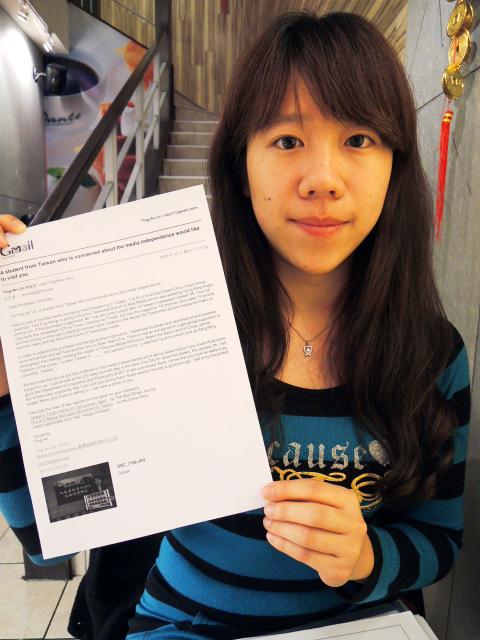Graduate student Lin Ting-an (林庭安) has publicized her exchanges with renowned US linguist and academic Noam Chomsky to rebut claims that the famed social activist had been misled into supporting the movement against media monopolization in Taiwan.
A photograph posted on Facebook on Jan. 5 by a female netizen who identified herself as Lao Tzu-hung (劉子鳳) showed the 84-year-old Massachusetts Institute of Technology professor posing with a poster that read: “Anti-Media Monopoly. Say no to China’s black hands, defend press freedom. I am safeguarding Taiwan here in MIT.”
The photograph triggered a fervent response among netizens, with some expressing gratitude for his support.

Photo: Liu Li-jen, Taipei Times
The Chinese-language China Times — owned by Want Want China Times Group, which is part of the consortium that bought Next Media Group’s four Taiwanese media outlets — on Tuesday quoted Liu Shih Diing (劉世鼎), a University of Macau associate communications professor, as saying Chomsky had been tricked by Taiwanese students into holding the sign. Liu was quoted as saying Chomsky did not understand the sign.
Lin responded on Tuesday by publicizing her correspondence with Chomsky on Dec. 26 last year, in which Lin explained the reasons for the movement against media monopolization.
“There is now an activity that urges global supporters to photograph themselves, holding the slogan ‘Oppose Media Monopoly, Reject the black hand of China, uphold freedom of the press, I protect Taiwan in _____,’ and upload it online,” the e-mail read.
In the e-mail Lin asked permission to visit Chomsky on Jan. 7 when she would be visiting MIT.
She said Chomsky replied to her e-mail by saying: “Glad to hear about what you are doing. An important struggle.”
Lin, who is studying at the Institute of Philosophy of Mind and Cognition at National Yang Ming University in Taipei, said that when she met Chomsky at MIT, he asked her to explain the situation again and she did.
Lin said she was certain Chomsky had a good understanding of the students’ campaign.

Alain Robert, known as the "French Spider-Man," praised Alex Honnold as exceptionally well-prepared after the US climber completed a free solo ascent of Taipei 101 yesterday. Robert said Honnold's ascent of the 508m-tall skyscraper in just more than one-and-a-half hours without using safety ropes or equipment was a remarkable achievement. "This is my life," he said in an interview conducted in French, adding that he liked the feeling of being "on the edge of danger." The 63-year-old Frenchman climbed Taipei 101 using ropes in December 2004, taking about four hours to reach the top. On a one-to-10 scale of difficulty, Robert said Taipei 101

Nipah virus infection is to be officially listed as a category 5 notifiable infectious disease in Taiwan in March, while clinical treatment guidelines are being formulated, the Centers for Disease Control (CDC) said yesterday. With Nipah infections being reported in other countries and considering its relatively high fatality rate, the centers on Jan. 16 announced that it would be listed as a notifiable infectious disease to bolster the nation’s systematic early warning system and increase public awareness, the CDC said. Bangladesh reported four fatal cases last year in separate districts, with three linked to raw date palm sap consumption, CDC Epidemic Intelligence

US climber Alex Honnold left Taiwan this morning a day after completing a free-solo ascent of Taipei 101, a feat that drew cheers from onlookers and gained widespread international attention. Honnold yesterday scaled the 101-story skyscraper without a rope or safety harness. The climb — the highest urban free-solo ascent ever attempted — took just more than 90 minutes and was streamed live on Netflix. It was covered by major international news outlets including CNN, the New York Times, the Guardian and the Wall Street Journal. As Honnold prepared to leave Taiwan today, he attracted a crowd when he and his wife, Sanni,

Taiwanese and US defense groups are collaborating to introduce deployable, semi-autonomous manufacturing systems for drones and components in a boost to the nation’s supply chain resilience. Taiwan’s G-Tech Optroelectronics Corp subsidiary GTOC and the US’ Aerkomm Inc on Friday announced an agreement with fellow US-based Firestorm Lab to adopt the latter’s xCell, a technology featuring 3D printers fitted in 6.1m container units. The systems enable aerial platforms and parts to be produced in high volumes from dispersed nodes capable of rapid redeployment, to minimize the risk of enemy strikes and to meet field requirements, they said. Firestorm chief technology officer Ian Muceus said